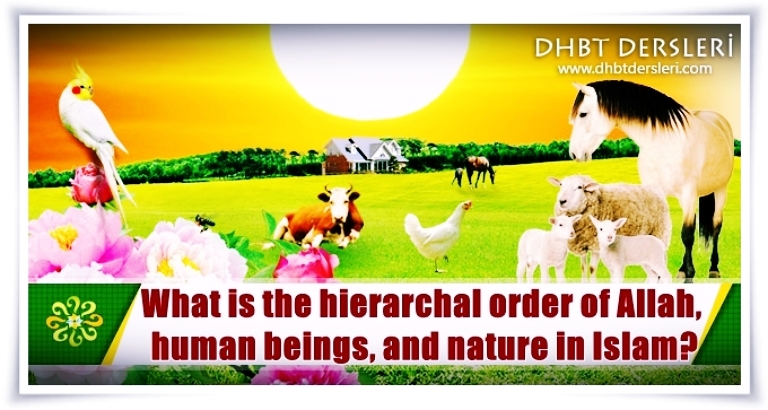How Does The Qur’an Describe Existence ?
There are two types of existences differing from each other by respective distinct natures:
1.Absolute and infinite existence: The existence of the Creator. It is a fundamental and essential existence, which has no beginning and no end. It is independent from time and space, because it is
He who creates time and location. It is a presence, which exists on its own accord, and its absence cannot be conceived.
There is no need to look for philosophical or logical explanations to prove His existence as His existence is proclaimed to human beings through the universe and through their own consciences.
Everything that exists is a proof of His existence.
2.Created existence: the existence of everything else. The existence of created beings is not essential and depends on the existence of the Creator.
The created being exists when Allah wills, where He wills and as long as He wills. The existence of the created being is possible as well as its absence.
What does the Qur’an say about the inception and conclusion of existence?
The beginning or ending of the existence of the Creator is not a subject of discussion, because beginnings and endings are only relevant for beings that are confined to time and space; it is irrelevant for the One who actually created time and space. The Creator of time and location cannot be confined within that same time and location.
Every created being has a definitive beginning, and all creatures that have a beginning will inevitably face an end. The universe and the galaxy that provide lodging for human beings have, like human beings, a life span.
It is an Islamic dogma that only Allah is capable of creating beings from nothing. The first law of thermodynamics proves that humans are absolutely unable to create energy from nothing. Any creation has a limited lifespan.
The second law of thermodynamics—the entropy law—is the manifestation of this truth in physics. Not only humans, but energy is finite as well, for it was, too, created.
The Qur’an calls that situation in which the final cosmic destination reaches absolute zero, “The Final Hour.” There are several âyahs about this time, in which the world will inevitably find its end on a day known to Allah alone.To conclude: The Creator is the landlord of created beings who are only tenants in existence.
According to the Qur’an, Allah is closer to us than our jugular veins. Thus, while Allah is not at a place one could walk to, those who strive toward Him can reach Him.
What is the hierarchal order of Allah, human beings, and nature in İslam?
The ordering of this hierarchy in Islam is as follows: Allah, human beings and then nature. Allah, the “Superior being” is the higher end of the hierarchy, and the world on the lower end is the “inferior being.” The duty of humans, therefore, is living a life in accordance with the purpose of Allah’s creation under the guidance of the divine writ. As Prophet Muhammad said, “The world is the means and the sowing field for attaining the Hereafter.” The Qur’an considers human beings as viceroys of Allah in the world (Naml 27:62).
In other words, “Allah entrusted humans with Earth, and wants them to protect and develop it.” A viceroy is a guardian, who establishes and lives a life based on justice and truth (tawheed). This responsibility aims at “constructing a role model.” Those among humans who realize this responsibility must fulfill it (‘Ali`Imran 3:104).
What is the İslamic point of view on nature and other creatures?
Allah entrusted nature to human beings: it is not our possession and we do not own it. Allah put the nature at the service of human beings to use it for contentment in this world and the Hereafter (Haj 22:65).
Are the world and things therein regarded with disapproval in İslam ?
The world and worldly things are not considered intrinsically bad and are not subject to disapproval. The world and material items are certainly not satanic or intrinsically evil, as religions affected by dualism and Gnosticism would argue. Allah uses them to test us humans.
If a human being wants to pass this test with dignity, he/she should see the world and worldly things as entrusted valuable items, for which they will be held accountable. Therefore, they should not deal with them as if with their own property that they could do whatever they desire.
Having prosperity and wealth is not condemned in Islam; rather attachment to these things is condemned—that is becoming worldly!
A human becoming worldly is akin to a horse mounting onto the rider. Worldliness overburdens the human being with ownership, as the horse would overburden the rider, and leads to all kinds of evil acts. In the words of the Prophet, considering worldly possessions as things entrusted to us and avoiding becoming attached to them is known as being a “faqeer.”
Faqeer is a spiritual state wherein you do not allow your wealth to possess you even if you have the treasures of the entire world.
Why does the Qur’an warn humans against an “obsession to multiply” worldly possessions?
The best way to respond to this question will be the Qur’anic chapter, which speaks precisely about this issue: “You are obsessed by greed for more and more until you go down to your graves. Nay, in time you will come to understand! And once again: Nay, in time you will come to understand! Nay, if you could but understand [it] with an understanding [born] of certainty, you would indeed, most surely, behold the blazing fire [of hell]! In the end you will indeed, most surely, behold it with the eye of certainty: and on that Day you will most surely be called to account for [what you did with] the boon of life!” (Takathur 102:1-8)

































